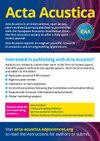Experimental investigation of flow-induced sound of kite lines
IF 1.4
3区 物理与天体物理
Q4 ACOUSTICS
引用次数: 0
Abstract
In times of increasing importance of renewable energies, airborne wind energy (AWE) systems represent an emerging extension to conventional wind turbines. Many AWE systems use powerful kites to provide tether traction to mechanically unwind the tether, generating electricity on the ground. In addition to the traction tether, a large number of kite lines spanning the kite are moved through the air at high speed. This can produce a loud unpleasant whistling noise on the ground, which is due to a superposition of the aeolian tones of the many different lines. In the present work, differently structured kite lines were investigated in the aeroacoustic wind tunnel with respect to their sound radiation when they were exposed to a flow at up to 34 ms−1 resulting in Re ≦ 7300 and angles of attack (AOA) in the range of 90° ≧ AOA ≧ 45°. It was found that greater surface roughness increases sound radiation while line tension has negligible influence. By weaving a single-helix-shaped protrusion into the sheath of the kite line, the total radiated sound pressure level can be reduced by up to 9 dB. If the line itself has a helical contour, even a reduction of up to 11.5 dB is reachable. For decreasing AOA the noise suppression effect of helical surface protrusions and helical line shape is significantly reduced. The results provide initial guidelines on how to effectively reduce sound radiation from aircraft kites. Further investigations should consider the individual contributions of fluid and structural sounds to the total radiated sound of a flying kite.风筝线流致声实验研究
在可再生能源日益重要的时代,机载风能(AWE)系统代表了传统风力涡轮机的新兴扩展。许多AWE系统使用强大的风筝来提供系绳牵引力,从而机械地松开系绳,在地面上发电。除了牵引系绳外,横跨风筝的大量风筝线在空中高速移动。这可以在地面上产生一种响亮的令人不快的呼啸声,这是由于许多不同线路的风吹音调的叠加。本文研究了不同结构的风筝线在空气声风洞中受34 ms−1气流影响时的声辐射,结果风筝线的Re≦7300,攻角在90°≧攻角≧45°范围内。结果表明,表面粗糙度越大声辐射越大,而线张力对声辐射的影响可以忽略不计。通过在风筝线的护套中编织一个单螺旋形的突出物,总辐射声压级可以降低高达9分贝。如果线路本身具有螺旋轮廓,甚至可以达到11.5 dB的降低。为了降低AOA,螺旋表面突起和螺旋线形的噪声抑制效果显著降低。研究结果为如何有效减少飞机风筝的声辐射提供了初步指导。进一步的研究应考虑流体声和结构声对风筝总辐射声的个别贡献。
本文章由计算机程序翻译,如有差异,请以英文原文为准。
求助全文
约1分钟内获得全文
求助全文
来源期刊

Acta Acustica
ACOUSTICS-
CiteScore
2.80
自引率
21.40%
发文量
0
审稿时长
12 weeks
期刊介绍:
Acta Acustica, the Journal of the European Acoustics Association (EAA).
After the publication of its Journal Acta Acustica from 1993 to 1995, the EAA published Acta Acustica united with Acustica from 1996 to 2019. From 2020, the EAA decided to publish a journal in full Open Access. See Article Processing charges.
Acta Acustica reports on original scientific research in acoustics and on engineering applications. The journal considers review papers, scientific papers, technical and applied papers, short communications, letters to the editor. From time to time, special issues and review articles are also published. For book reviews or doctoral thesis abstracts, please contact the Editor in Chief.
 求助内容:
求助内容: 应助结果提醒方式:
应助结果提醒方式:


